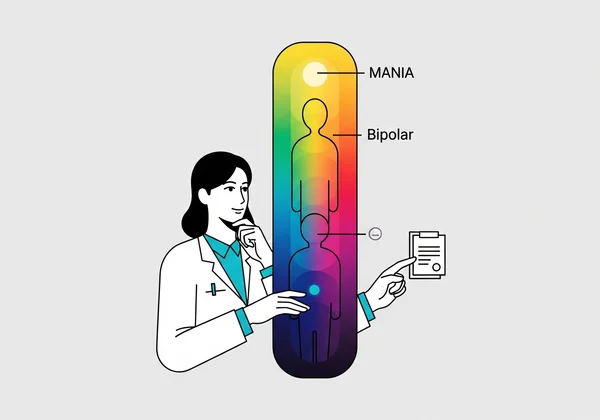Bipolar Disorder Test & Myths: Your Guide to Stigma-Free Facts
November 20, 2025 | By Leo Vance
The world of mental health is often clouded by misunderstanding and stigma, and few conditions are as misrepresented as bipolar disorder. These widespread bipolar disorder myths can create a barrier of fear and confusion, preventing people from seeking the clarity they deserve. If you've ever found yourself wondering about intense emotional shifts and asking, 'Is there a reliable Bipolar Disorder Test to understand my symptoms?', you've come to the right place. This article is designed to cut through the noise, debunk harmful stereotypes, and provide you with stigma-free facts.
Understanding is the first step toward empowerment. By separating fiction from reality, you can gain a clearer perspective on your own experiences or those of a loved one. It’s about replacing anxiety with knowledge and taking a proactive step towards well-being. A great starting point for this journey is a confidential screening test, which can offer initial, private insights into your emotional patterns.

Tackling Common Bipolar Disorder Misconceptions
Misinformation can make it difficult to recognize potential symptoms. Let's start by clarifying what bipolar disorder is—and what it is not—by addressing some of the most common inaccuracies head-on.
Myth 1: Is Bipolar Just "Mood Swings"?
One of the biggest myths is that bipolar disorder is simply an exaggerated form of everyday mood swings. While everyone experiences emotional ups and downs, the shifts in bipolar disorder are far more extreme, persistent, and disruptive. These are not just bad moods; they are distinct episodes of mania (or hypomania) and depression that can last for weeks or even months. These episodes significantly impact energy levels, sleep patterns, judgment, and the ability to carry out daily tasks. Unlike a typical bad day, these shifts represent a major change from a person's usual self.
Myth 2: Do Bipolar Symptoms Always Look the Same?
The idea that all bipolar symptoms present identically is false. Bipolar disorder exists on a spectrum. The most well-known types include Bipolar I, defined by at least one manic episode, and Bipolar II, characterized by hypomanic (less severe) and depressive episodes. Cyclothymic disorder involves numerous periods of hypomanic and depressive symptoms that are less severe than major episodes. Each person's experience is unique, shaped by the frequency, duration, and intensity of their mood episodes. This is why a one-size-fits-all description is not only inaccurate but also unhelpful.
Myth 3: Can You Self-Diagnose Bipolar Disorder?
With a wealth of information online, it's tempting to self-diagnose bipolar disorder. However, this is a complex condition that requires a professional evaluation. Many other conditions, such as ADHD, anxiety, and borderline personality disorder, have overlapping symptoms. A mental health professional is trained to differentiate between these conditions through a comprehensive assessment. While online tools can be an excellent starting point, they are designed for screening, not diagnosis. You can take the first step with a reliable screening tool to gather information before speaking with a professional.

Understanding Bipolar Stigma: Separating Fact from Fiction
Stigma often stems from fear and a lack of accurate information. By confronting these damaging stereotypes, we can foster a more compassionate and supportive environment for everyone.
Myth 4: Are People with Bipolar Always Dangerous or Unpredictable?
Media portrayals often depict individuals with bipolar disorder as inherently dangerous or erratic. This is a harmful and inaccurate stereotype. The vast majority of people with bipolar disorder are not violent. When their condition is properly managed through treatment, they can lead stable, predictable, and productive lives. Impulsive behavior can be a symptom of a manic episode, but with effective management strategies, these risks can be significantly reduced. Framing bipolar disorder around the idea of being bipolar and unpredictable perpetuates a damaging stigma.
Myth 5: How Common is Bipolar Disorder, Really?
Another misconception is that bipolar disorder is a rare condition. In reality, it is more common than many people think. According to the National Institute of Mental Health (NIMH), an estimated 2.8% of U.S. adults had bipolar disorder in the past year. Globally, millions of people live with the condition. Understanding its prevalence helps reduce the sense of isolation that many feel and reinforces that if you are struggling, you are not alone.
Myth 6: Does Bipolar Only Affect Adults?
While symptoms often emerge in late adolescence or early adulthood, it is a myth that bipolar disorder only affects adults. The condition can and does occur in teenagers and, less commonly, in children. Diagnosing bipolar in teenagers can be challenging because mood swings are a typical part of adolescence. However, the extreme and disruptive nature of bipolar episodes is distinct from normal teenage angst. Early recognition and intervention are crucial for improving long-term outcomes.

Navigating Treatment & Life with Bipolar: Dispelling More Myths
Myths about treatment and daily life can create hopelessness. The truth is that with the right support, individuals with bipolar disorder can thrive. A good way to begin understanding your own patterns is with our free online test.
Myth 7: Is Medication the Only Answer for Bipolar?
Medication, particularly mood stabilizers, is a cornerstone of bipolar treatment, but it is rarely the only component. A comprehensive treatment plan typically includes psychotherapy (like Cognitive Behavioral Therapy), education about the condition, and lifestyle management. Learning to maintain a regular schedule for sleep, diet, and exercise is vital for mood stability. Therapy provides crucial coping skills for managing symptoms and navigating life’s challenges.
Myth 8: Can You Lead a Normal Life with Bipolar?
Absolutely. The belief that a bipolar diagnosis means you cannot have a fulfilling career, meaningful relationships, or a stable family life is one of the most damaging myths. Many successful and creative individuals across all professions live with bipolar disorder. While it requires ongoing management and self-awareness, leading a bipolar and normal life is an achievable reality for millions. Treatment empowers individuals to manage their symptoms and pursue their goals.
Myth 9: Is Bipolar Disorder Just a "Personality Flaw"?
Bipolar disorder is not a weakness of character or a bipolar personality flaw. It is a legitimate medical condition rooted in biological factors, including genetics and brain chemistry. Attributing its symptoms to a personality defect is like blaming someone with diabetes for their blood sugar levels. Recognizing it as a health condition is essential for removing blame and encouraging people to seek the medical care they need. Taking a bipolar symptoms test can be a helpful step in seeing these patterns as symptoms, not flaws.
Myth 10: Is Bipolar Disorder a "Real" Illness?
Finally, let’s be clear: bipolar disorder is a real illness. It has been extensively studied and is recognized by major medical and psychiatric organizations worldwide, including the World Health Organization. Its biological basis is well-documented, involving imbalances in neurotransmitters and distinct patterns in brain function. Dismissing it as anything less than a real illness invalidates the experiences of those who live with it and discourages them from seeking help.

Empowering Understanding: Your Path Beyond the Myths
Letting go of these myths is a powerful act. It opens the door to accurate information, self-compassion, and effective action. Knowledge allows you to understand your experiences, support your loved ones better, and confidently seek the right help.
If what you've read resonates with you, the next step doesn't have to be overwhelming. A simple, confidential online screening can provide valuable initial insights into your mood patterns. It's a private, pressure-free way to explore your concerns and prepare for a more informed conversation with a healthcare provider.
Ready to gain clarity? Try our free bipolar disorder test today.
Frequently Asked Questions About Bipolar Disorder
How do you get tested for bipolar disorder?
A formal diagnosis for bipolar disorder is made by a qualified mental health professional, such as a psychiatrist or psychologist. The process involves a comprehensive evaluation, including a discussion of your symptoms, personal and family medical history, and sometimes a physical exam to rule out other causes. While there is no blood test, screening questionnaires can be a valuable first step. You can get initial insights on our website to help you prepare for that conversation.
What is commonly mistaken for bipolar disorder?
Several conditions have symptoms that overlap with bipolar disorder. These include major depressive disorder (unipolar depression), attention-deficit/hyperactivity disorder (ADHD), anxiety disorders, and borderline personality disorder (BPD). The key difference often lies in the presence of distinct manic or hypomanic episodes. A professional evaluation is essential to distinguish between these conditions.
Am I bipolar or borderline personality disorder?
This is a common point of confusion. While both can involve mood instability and impulsivity, the patterns are different. Bipolar disorder is characterized by sustained episodes of depression and mania/hypomania that can last for weeks or months. In contrast, the emotional shifts in BPD are often more rapid, triggered by interpersonal events, and occur over hours or days. A bipolar screening questionnaire can help identify patterns consistent with bipolar disorder.
What happens if bipolar disorder is left untreated?
If left untreated, bipolar disorder can have serious consequences on a person’s health, relationships, and career. The mood episodes may become more frequent or severe over time. It can lead to problems with substance abuse, damaged personal and professional relationships, financial difficulties, and an increased risk of self-harm. Seeking timely treatment is crucial for managing the condition and improving quality of life. Don't wait to get clarity; start your test today.
Disclaimer: This article is for informational purposes only and does not constitute medical advice. The content is not intended to be a substitute for professional medical advice, diagnosis, or treatment. Always seek the advice of your physician or another qualified health provider with any questions you may have regarding a medical condition. The screening tool on our website is not a diagnostic test.